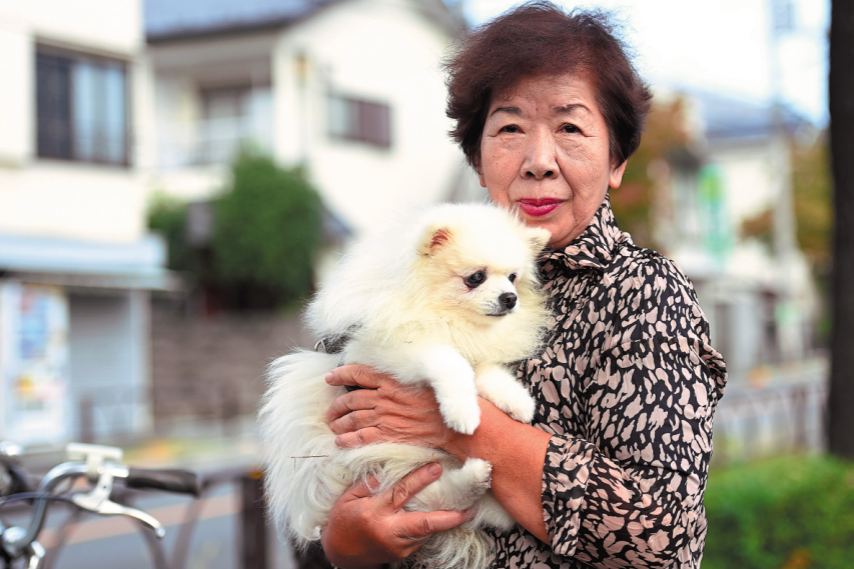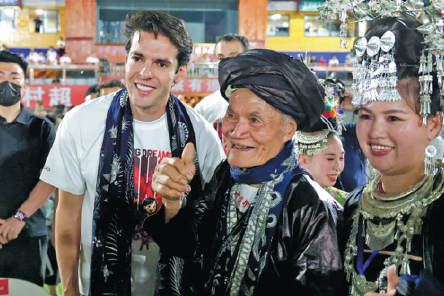Aging together
Single Japanese women help sustain each other as they grow old

Editor's note: In this weekly feature China Daily gives voice to Asia and its people. The stories presented come mainly from the Asia News Network (ANN), of which China Daily is among its 20 leading titles.

In Amagasaki of Japan's Hyogo Prefecture, a group of seven elderly women have been practicing a "Friends Living Nearby" lifestyle — generating much interest in their community and beyond.
The "Koko Seven" or "Individual Seven" group of single women who wanted to maintain their habit of "friends living close to each other" is based in a condominium in the city.
Kiku Taya, 89, the oldest member of the group, lives in the condo and explained their choice: "We're not like a family. We're just close neighbors. We help each other but we are not dependent on each other."
Reiko Ichikawa, 86, who lives near the condo, added: "We spend time alone or get together. We enjoy each other's company while maintaining our self-help life. That's what Individual Seven means."
Yoshie Ichinotsubo, 79, and Kimi Kawana, 77, the youngest member, live in separate units in the building.
It all started about two decades ago. Taya, who was at the time the head of a citizens group that considered matters related to aging, and Ichikawa, who was the chair of a social welfare corporation that runs a nursing home, came up with the idea of "singles living together", along with one other person.
They began asking around, saying that anyone who was seriously interested in the idea could join, including friends of friends. Four more members later joined the group, including Kawana, a journalist, and Ichinotsubo, a copywriter.
Although their backgrounds were different, with some being unmarried and others divorced, all seven members had long careers and were approaching their old age and living alone.

Knowing neighbors
After their first meeting to introduce themselves, they began to know each other through staying overnight together three times, comparing and adjusting their feelings about what kind of lifestyle they wanted to lead.
"I asked the other members, in the form of a questionnaire, the kind of questions that were difficult to ask, such as how much money they could afford to spend, and then shared the answers with all the members," Taya said.
Various criteria were considered, such as having individual dwellings, each with a kitchen and toilet, and available at an affordable price.
Initially, the group members thought about building a communal house on rented land, but it was not financially feasible.
They also had a hard time searching for a place to live together. But things advanced quickly after they found a relatively low-priced, new condo.
In the autumn of 2008, four group members moved into the condo while two others began living in the neighborhood.
At the time, their ages ranged between 61 and 73. They agreed that they would not provide nursing care to each other.
Three of the members signed a voluntary guardianship contract with a lawyer, who would then act as their guardian in the event that a member's judgment became impaired due to dementia. A contract was also signed entrusting the lawyer to take care of their bodies and belongings after they died.
They also decided to avoid keeping relationships solely within the group, with each member contributing to the local community in her own way, thus maintaining their social ties.
In 2009, the group began holding a monthly gathering of local residents called "salon du samedi" or "Saturday salon". Lectures by guest speakers with topics including music, cooking and international issues were held, with about 30 people attending at a time.
Another member who was living in the condo developed dementia. Other members of the group noticed her change and were able to have her examined by a doctor and get in touch with the lawyer, who took charge of the necessary procedures based on the guardianship contract.
The member moved to a group home in the autumn of 2022. The facility provides care to a small group of people with dementia who live together. Although she lives in the group home, she still goes to the Saturday salon.
One of the members who lived close to the condo and took part in the group's meeting died in June from an illness. The funeral and other postmortem arrangements had been made before her death.
Sharing time
Ryoko Fukuzawa, a researcher at the Dai-ichi Life Research Institute, noted the appeal of such a way of living as "the comfort of living together with other people, by sharing an enjoyable time and having a spirit of cooperation that would come naturally".
But there are also difficulties such as when people have differing sets of values that were established during their long lives. There are also differences in what people are able to do as they get older, she said.
"Don't always expect everyone to be equal, and don't always rely on others to help you," Fukuzawa said. "Tolerance is also important."
According to Fukuzawa, groups of singles helping each other is also popular in Denmark. She said there is a long waiting list of people seeking "cohousing", which combines individual dwellings with common facilities.
Fukuzawa explained that when the average age of the residents rises too high, it becomes difficult to maintain this form of communal living, so the management of such facilities will sometimes have relatively younger people on the waiting list move in first. This kind of planning will also become important in maintaining mutual support relationships.
Some group members also have concerns about their health.
"Even if I don't feel like undergoing rehabilitation, others encourage me by saying, 'Keep at it,' or 'You'll get more frail.' So, I keep on doing it," Ichinotsubo said.
There are no leaders or factions within the group, and all the members have good relations with each other. But everyone knows that it will not remain that way forever.
The members will grow older, and someone will eventually be the last one in the group. They all expressed the worry: "What if I become the last remaining member?"
"We should all be making our own preparations for the end of our life, so our final days will hopefully be as short as possible," Taya said.
"Until then, let us enjoy our long old age together. That is the lifestyle we have chosen to lead."
YOMIURI SHIMBUN, JAPAN































